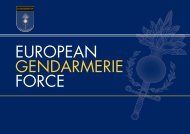Conference
science-research-bulletin-2013-conference
science-research-bulletin-2013-conference
Create successful ePaper yourself
Turn your PDF publications into a flip-book with our unique Google optimized e-Paper software.
EUROPEAN POLICE SCIENCE AND RESEARCH BULLETIN<br />
SPECIAL CONFERENCE EDITION<br />
The latest advances in the direction of independent<br />
investigation were born largely out of the need<br />
to address the deep alienation from the police<br />
of one section of the divided community in<br />
Northern Ireland. In a penetrating and persuasive<br />
report commissioned by the Northern Ireland<br />
government in 1995, Maurice Hayes proposed the<br />
establishment of an Office of Police Ombudsman<br />
(OPONI) with radical powers of independent<br />
investigation (Hayes, 1997). In many substantial<br />
aspects the Hayes proposals were ahead of the<br />
curve. It was not until 2009 that the European<br />
Commissioner for Human Rights produced an<br />
opinion on human rights based best practice in<br />
the independent and effective determination<br />
of complaints against the police (Hammerburg,<br />
2009). Based largely on the evolving jurisprudence<br />
of the European Court of Human Rights since the<br />
late 1990’s, the opinion is heavily reflective of the<br />
principles underpinning the Hayes report.<br />
The OPONI was provided for by the Police<br />
(Northern Ireland) Act 1998 and was established<br />
in 2000. Prompted partly by the ECtHR<br />
jurisprudence, England and Wales introduced<br />
reforms in the same direction in 2002 with a<br />
multi-member Independent Police Complaints<br />
Commission (IPCC) ( 8 ). A combination of the<br />
European Court’s jurisprudence and a crisis of<br />
public confidence in the police and in the police<br />
complaints system, compelled the Republic of<br />
Ireland to provide for a similar multi-member<br />
Ombudsman Commission in the Garda Síochána<br />
Act 2005 (Conway, 2009; Walsh, 2004a; 2004b).<br />
It opened for business in 2007. Finally, Scotland<br />
came later to the independent investigation of<br />
complaints, outside of criminal allegations. To<br />
some extent this can be attributed to significant<br />
differences in criminal procedure between<br />
Scotland and the other jurisdictions. Outside of<br />
the role of the independent Procurator Fiscal in<br />
criminal matters, provision for an independent<br />
review mechanism was first made in Scotland<br />
in the Police, Public Order and Criminal Justice<br />
(Scotland) Act 2006. The Police Complaints<br />
Commissioner for Scotland, established pursuant<br />
to that Act, was renamed the Police Investigations<br />
and Review Commissioner (PIRC) in 2013, pursuant<br />
to the Police and Fire Reform (Scotland) Act 2012.<br />
The PIRC has independent powers of investigation<br />
in respect of certain serious complaints; similar<br />
in some respects to those of the other police<br />
complaints bodies.<br />
THE LATEST REFORMS<br />
The latest reforms differ in some detail across<br />
the four jurisdictions, but they are similar in<br />
most of the essential aspects. Broadly they all<br />
purport to offer the prospect of complaints<br />
being investigated entirely independently of the<br />
police. The Ombudsman in Northern Ireland,<br />
for example, is appointed by the Prime Minister<br />
following an open competition. He or she cannot<br />
be a former police officer, and the independence<br />
of the office is statutorily guaranteed. Similar<br />
arrangements apply to the members of the<br />
Commissions in the other jurisdictions, with<br />
the notable exception of the Republic of Ireland<br />
where the process lacks transparency. The<br />
members of the Garda Síochána Ombudsman<br />
Commission are appointed by the President on<br />
the nomination of the government and with the<br />
approval of the House of Parliament. In practice,<br />
however, the nominations are chosen secretly by<br />
the Minister for Justice, Equality and Defence (the<br />
same Minister with responsibility for policing)<br />
with no independent interviews or open<br />
competition. It is also worth noting that none of<br />
the appointments procedures are fully compliant<br />
with the best human rights based practice, as<br />
set out in the opinion of the European Human<br />
Rights Commissioner. This stipulates that the<br />
Ombudsman or Commission members should be<br />
appointed by, and accountable to, the relevant<br />
legislative assembly (Hammerburg, 2009).<br />
Critically, the Ombudsman and Commissions<br />
recruit and train their own investigative staff.<br />
Equally important and unprecedented is the<br />
fact that they can exercise the same powers of<br />
arrest, detention, interrogation, entry, search and<br />
seizure etc. as police officers. In effect they are<br />
the equivalent of police officers whose function is<br />
confined to investigating the alleged infractions<br />
of conventional police officers. In those cases<br />
actually investigated by the independent<br />
investigators, the investigation reports are<br />
submitted directly to the Ombudsman or<br />
Commission which generally can decide whether<br />
to: refer the file on to the independent public<br />
prosecutor; recommend disciplinary charges to<br />
the relevant police chief; trigger a local or informal<br />
resolution procedure; or take no further action.<br />
The powers of the Scottish PIRC are more limited<br />
in these matters than those of the other bodies.<br />
It is also worth noting that the Ombudsman<br />
and Commissions have the power to initiate<br />
( 8 ) Police Reform Act 2002, Part 2.<br />
50





